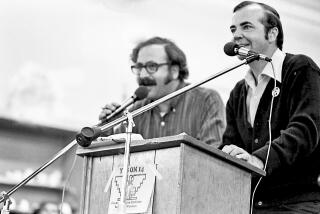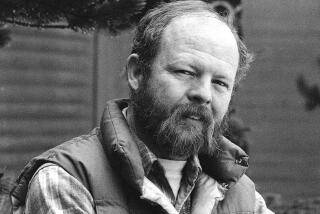Jay D. Hair, 56; Made National Wildlife Federation Into a Force for Change
- Share via
Jay D. Hair, former head of the National Wildlife Federation, credited with transforming the group into the nation’s largest grass-roots environmental organization and a powerful lobbying force, has died. He was 56.
Hair died Friday in his home in suburban Seattle of bone-marrow cancer.
During his tenure, from 1981 to 1995, Hair changed the organization from something of a conservative sportsmen’s club to a 6-million-member group of activists focused on environmental reform. Membership has since declined to about 4.5 million.
In his final year as head of the National Wildlife Federation, Hair was elected president of the International Union for Conservation of Nature and Natural Resources, an organization of 10,000 scientists, policymakers and volunteers from 181 countries.
He held that position through 1996, when he presided over the World Conservation Congress.
Hair was a professor of zoology, forestry and wildlife biology who grew up hunting and fishing and learning from his uncles what he described as “the unspoken laws of sportsmanship and stewardship for the land.”
He became intrigued with the potential of the National Wildlife Federation when he attended a meeting of the organization in 1974.
Hair studied management and prepared himself to guide the group into working for environmental goals.
As a speaker and as writer of a column for the National Wildlife Federation’s magazine, he also became what the Washington Post once described as “the most visible spokesman of mainstream environmentalism.”
Hair was never afraid to express his strong views to leaders, including a string of U.S. presidents.
He cut his teeth on the effort to oust President Reagan’s controversial first secretary of the Interior, James Watt, who was considered more interested in promoting business than the environment.
Initially reluctant to join the fray because most of his members had voted for Reagan, Hair changed his mind when he learned that members also overwhelmingly opposed Watt.
By the time Watt resigned in 1983, Hair was recognized as a master of public relations.
The environmental spokesman also became a visible and tenacious opponent of Reagan’s short-tenured head of the Environmental Protection Agency, Anne McGill Burford.
Among Hair’s key projects were making the federal Clean Air Act tougher, reintroducing wolves to Yellowstone National Park and reducing the flow of toxic waste into the Great Lakes.
Born in Miami, Hair was 3 months old when his father left the family and his mother moved her three children to her family’s farm in Indiana. She later married a DuPont chemical engineer in Pennsylvania.
Hair earned a bachelor’s degree in biology and a master’s in zoology at Clemson University in South Carolina. After a year as an Army officer serving as a public health advisor in Vietnam, he earned a doctorate in zoology from the University of Alberta in Canada.
He taught at Clemson and North Carolina State University.
As he became increasingly involved in environmental work, he served as president of the South Carolina Wildlife Federation in 1976-77, the year it was chosen outstanding affiliate by the national organization.
The National Wildlife Federation recently named the education center at its new Reston, Va., headquarters in Hair’s honor.
Hair is survived by his wife of nine years, Leah Knapp Hair; his mother, Ruth Johnson of Newark, Del.; two daughters, Catherine Hair of Apex, N.C., and Lindsay Hair of New York City; two stepsons, Colin and Benjamin Patton of Seattle; a brother, Col. Dwight Hair of Elkton, Md.; and a sister, Paulette Pyle of Avondale, Pa.
The family has asked that any memorial donations be made either to Long Live the Kings, which works to restore wild salmon; Global Partnerships, which provides loans to needy villages in Latin America; or the Biodiversity Fund of the World Conservation Union.
More to Read
Sign up for Essential California
The most important California stories and recommendations in your inbox every morning.
You may occasionally receive promotional content from the Los Angeles Times.













